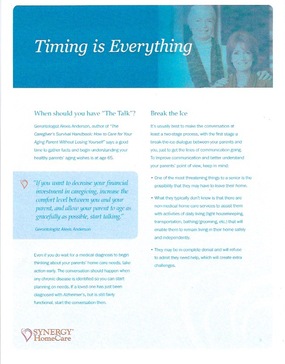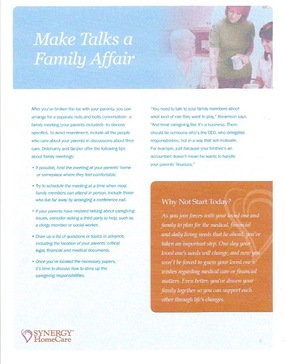“We Need to Talk”
Just when you thought you’ve already tackled the stickiest conversation ever with a family member—the one about s-e-x with your preteens—here comes the next talk no one feels prepared to have. With your parents well into retirement years, the awkward conversation today is about whether, when and how you, your siblings and/or a home health agency should take on some or all of the care of your older parents.
If not handled delicately, the conversation can turn into an emotional tug of war. You could wind up on one side, battling to protect your parents’ health and safety. Your parents could brace themselves on the opposite end of the rope, fighting to preserve their independence. Clearly, the emotional stakes are high, as are the chances for misunderstandings and bruised feelings. It’s no wonder you’ve wanted to put off this conversation for as long as possible.
Timing Is Everything
When should you have “The Talk”? Gerontologist Alexis Anderson, author of “The Caregiver’s Survival Handbook: How to Care for Your Aging Parent Without Losing Yourself” says a good time to gather facts and begin understanding your healthy parents’ aging wishes is at age 65. “If you want to decrease your financial investment in caregiving, increase the comfort level between you and your parent, and allow your parent to age as gracefully as possible, start talking,” she has said.
Even if you do wait for a medical diagnosis to begin thinking about your parents’ home healthcare needs, take action early, advises Ed Lowe, director of medical services for SYNERGY HomeCare. “The conversation should happen when any chronic disease is identified so you can start planning on needs,” Lowe says. “If Mom has just been diagnosed with Alzheimer’s, but it still fairly functional, start the conversation then.”
Break the Ice
It’s usually best to make The Conversation at least a two-stage process, with the first stage a break-the-ice dialogue between your parents and you, just to get the lines of communication going. To improve communication and better understand your parent’s point of view, keep in mind:
- One of the most threatening things to a senior is the possibility that they may have to leave their home.
- What they typically don’t know is that there are non-medical home care services to assist them with activities of daily living (light housekeeping, transportation, bathing/grooming, etc.) that will enable them to remain living in their home safely and independently.
- They may be in complete denial and will refuse to admit they need help, which will create extra challenges.
So how do you first broach the touchy topic with your parents?
- “Many people have written a letter to allow their parent to take all the concerns in prior to having the conversation,” Abramson has said. “Print out articles. Or reference what a friend is dealing with as a caregiver. Start in a gentle way.”
- “Make the conversation around your parent’s quality of life and let them know you’re there to protect their independence,” Lowe advises.
- “Don’t go in with preconceived notions of what your parents might say,” write Hugh Delehanty and Elinor Ginzler in “Caring for Your Parent: The Complete AARP Guide.” “Approach with an attitude of listening, not telling.”
Icebreaking Phrases
For an extra boost of confidence, here are some handy icebreaking phrases you can try:
“Can I get your opinion on a couple of things, Mom?”
“I heard of a service that can send a lady to cook lunch for seniors. What do you think of this idea?”
“Dad, I’m really worried about you falling on the stairs; you’ve tripped a couple of times. How can I help keep you safe?”
“Mom, can we spend five minutes jotting down ideas about getting someone else to do some work in the house? I made us some tea.”
Make Talks a Family Affair
After you’ve broken the ice with your parents, you can arrange for a separate nuts-and-bolts conversation—a family meeting (your parent included)—to discuss specifics. To avoid resentment, include all the people who care about your parent in discussions about their care. Delehanty and Ginzler offer the following tips about family meetings:
- If possible, hold the meeting at your parents’ home or some place where they feel comfortable.
- Try to schedule the meeting at a time when most family members can attend in person. Include those who live far away by arranging a conference call.
- If your parents have resisted talking about caregiving issues, consider asking a third party to help, such as a clergy member or social worker.






- Draw up a list of questions or topics in advance, including the location of your parents’ critical legal, financial and medical documents.
- Once you’ve located the necessary papers, it’s time to discuss how to divvy up the caregiving responsibilities.
“You need to talk to your family members about what kind of role they want to play,” Abramson has said. “And treat caregiving like it’s a business. There should be someone who’s the CEO, who delegates responsibilities, but in a way that will motivate. For example, just because your brother’s an accountant doesn’t mean he wants to handle your parents’ finances.”
Why Not Start Today?
As you join forces with your loved one and family to plan for the medical, financial and daily living needs that lie ahead, you’ve taken an important step. One day your loved one’s needs will change, and now you won’t be forced to guess your loved one’s wishes regarding medical care or financial matters. Even better, you’ve drawn your family together so you can support each other through life’s changes.
Don’t Go It Alone
If you and your family can’t meet all of your loved one’s needs to remain independent and maintain a high quality of life, it’s good to know Synergy HomeCare offers a variety of services that can fill the gap. If you would like a free home assessment or answers to your questions and concerns, visit us online at www.synergyhomecare.com.